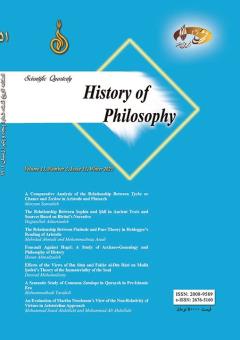A Comparative Analysis of the Relationship between Tyche or Chance and Techne in Aristotle and Plutarch
Subject Areas : Comparative studies in the field of history of philosophy
1 - Assistant Professor, Department of Islamic Studies, University of Maragheh, Maragheh, Iran
Keywords: Tyche, fortune, Chance, techne, practical ability, Aristotle, Plutarch,
Abstract :
Aristotle holds a dual approach to the relationship between techne and tyche (chance). On the one hand, he uses the two terms in the same meaning with the same subject in his Nichomacean Ethics, and in Rhetoric introduces chance as the cause of attaining a limited number of good things through techne. On the other hand, he connects techne and experience with chance and lack of experience and introduces techne and chance as two opposing concepts. This is because he believes that experience creates techne, and lack of experience exposes Man to chance and accident. A study of Aristotle’s thoughts reveals the reality that techne cannot originate in chance because it demands the knowledge of cause, while chance or luck is an accidental, indeterminate, and unstable cause. Moreover, a study of the relation of techne to aletheia or unconcealedness and disclosure indicates that techne cannot emerge from chance. The reason is that, in Aristotle’s view, techne is a rational virtue that results in revealing the truth, which is itself the result of artists’ knowledge and awareness of the outcome of their craft. Similar to Aristotle, Plutarch accepts chance as a cause; however, he maintains that the existence of techne renders chance meaningless. He believes that techne is rooted in human wisdom and cannot arise from chance.
1. ارسطو (1385الف)، اخلاق نیکوماخوس، ترجمه محمد حسن لطفی، تهران: نشر نی.
2. ارسطو (1385ب)، سماع طبیعی (فیزیک)، ترجمه محمد حسن لطفی، تهران: نشر طرح نو.
3. ارسطو (1385ج) متافیزیک، ترجمه محمد حسن لطفی، تهران: نشر نی.
4. ارسطو (1392)، خطابه، ترجمه اسماعیل سعادت، تهران: انتشارات هرمس.
5. افلاطون (1366)، دوره کامل آثار افلاطون (رساله پروتاگوراس)، جلد اول، ترجمه محمدحسن لطفی تبریزی و رضا کاویانی، شرکت سهامی انتشارات خوارزمی.
6. افلاطون (1366)، دوره آثار افلاطون (رساله قوانین)، جلد چهارم، ترجمه محمد حسن لطفی تبریزی، شرکت سهامی انتشارات خوارزمی.
7. پلوتارک (1343)، حیات مردان نامی، جلد اول، ترجمه رضا مشایخی، تهران: بنگاه ترجمه و نشر کتاب.
8. صمدیه، مریم و مجید ملایوسفی (1396)، ارسطو و فرونسیس(حکمت عملی)، فصلنامه علمی-پژوهشی آینه معرفت، سال هفدهم، شماره پنجاه و سوم، صص 1-24.
9. Altman, M. E. (2009), "Praxis and theoria: Heidegger's violent interpretation.
10. Angier, T. (2010). Techné in Aristotle's ethics: Crafting the moral life. Bloomsbury Publishing.
11. Aristotle (1926), Aristotle: the art of rhetoric, with an English translation by John Henry Freese, Harvard university press.
12. Aristotle (2004) Nicomachean Ethics, Translated and Edited by Roger Crisp, Cambridge University Press.
13. Aristotle (2009) Nicomachean Ethics, Translated and Edited by Ross David, Oxford University Press.
14. Bowden, P. (2005) Virtue ethics, Aristotle and organisational behavior, Australian Association for Professional and Applied Ethics 12th Annual Conference 28–30 September 2005, Adelaide.
15. Devettere, R. J. (2002) Introduction to virtue ethics: Insights of the ancient Greeks. Georgetown University Press.
16. Dostal, R.J., (1985). Beyond Being: Heidegger's Plato. Journal of the History of Philosophy, 23(1), pp.71-98.
17. Halverson, R. (2002) Representing phronesis: Supporting instructional leadership practice in schools (Doctoral dissertation, NORTHWESTERN UNIVERSITY).
18. Heidegger, M. (1992), Gesamtausgabe: Platon Sophistes.
19. Jedan, C. (2009) Stoic Virtues: Chrysippus and the Religious character of stoic Ethics, continuum
20. Kenny, A. (2004) Ancint philosophy: A new history of Western philosophy, Volume I, Clarendon Press, Oxford.
21. Parry, R. (2020) Episteme and techne, the Stanford Encyclopedia of Philosophy, (First published Fri Apr 11, 2003; substantive revision Fri Mar 27, 2020), (https://plato.stanford.edu/entries/episteme-techne/).
22. Pender, Kelly. (2011) Techne, from neoclassicism to postmodernism: understanding writing as a useful, teachable art. Parlor Press LLC.
23. Plutarch. (1918) Plutarch lives (VI: Dion and Brutus,Timoleon and Aemilius Paulus) with an English translation by Bernadotte Perrin, Harvard university press, the Loeb classical library.
24. Plutarch. (1928) Moralia (De Fortuna). with an English Translation by. Frank Cole Babbitt. Cambridge, MA. Harvard University Press. London. William Heinemann Ltd. (http://www.perseus.tufts.edu/hopper/text?doc).
25. Plutarch. (1874) Plutarch's Morals (De fato). Translated from the Greek by several hands. Corrected and revised by. William W. Goodwin, PH. D. Boston. Little, Brown, and Company. Cambridge. Press Of John Wilson and son. (http://www.perseus.tufts.edu/hopper/text?doc).
26. Tessitore, A. (1996) Reading Aristotle's ethics: Virtue, rhetoric, and political philosophy. SUNY Press.
27. Sheng, W. (2016). On Political Freedom in Public Sphere in View of the Contrast Between Téchne and Túche–A Comparison Between Arendt and Heidegger. Yearbook for Eastern and Western Philosophy, 2016(1), 93-111.


